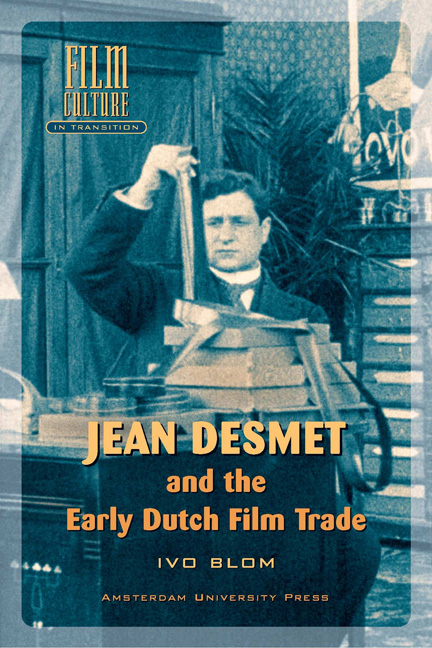Book contents
- Frontmatter
- Dedication
- Contents
- Preface
- Abbreviations, Unidentified Films and Historical Currencies
- Introduction
- I La Comète Belge: Jean Desmet’s Travelling Cinema, The Imperial Bio (1907-1910)
- II In The Beginning…: Film Distribution in the Netherlands Before Desmet
- III Gold Rush: In the Throes of Cinema Mania (1909-1914)
- IV Film Market Europe: Buying Films Abroad (1910-1914)
- V White Slave Girls and German Kultur: Film Rental and Distribution Strategies in the Netherlands (1910-1914)
- VI Onésime et Son Collègue: Competition (1910-1914)
- VII Das Ende vom Lied: The Impact of the First World War (1914-1916)
- VIII Quo Vadis?: Desmet’s Film Rental and Cinema Operation During the Great War (1914-1916)
- IX Afterlife: A New Career and the Beginning of a Collection
- X In Retrospect: Jean Desmet’s Place in Film History
- Notes
- Bibliography
- Photo Credits
- Film Culture in Transition
- Index of Film Titles
- General Index
V - White Slave Girls and German Kultur: Film Rental and Distribution Strategies in the Netherlands (1910-1914)
Published online by Cambridge University Press: 14 January 2021
- Frontmatter
- Dedication
- Contents
- Preface
- Abbreviations, Unidentified Films and Historical Currencies
- Introduction
- I La Comète Belge: Jean Desmet’s Travelling Cinema, The Imperial Bio (1907-1910)
- II In The Beginning…: Film Distribution in the Netherlands Before Desmet
- III Gold Rush: In the Throes of Cinema Mania (1909-1914)
- IV Film Market Europe: Buying Films Abroad (1910-1914)
- V White Slave Girls and German Kultur: Film Rental and Distribution Strategies in the Netherlands (1910-1914)
- VI Onésime et Son Collègue: Competition (1910-1914)
- VII Das Ende vom Lied: The Impact of the First World War (1914-1916)
- VIII Quo Vadis?: Desmet’s Film Rental and Cinema Operation During the Great War (1914-1916)
- IX Afterlife: A New Career and the Beginning of a Collection
- X In Retrospect: Jean Desmet’s Place in Film History
- Notes
- Bibliography
- Photo Credits
- Film Culture in Transition
- Index of Film Titles
- General Index
Summary
From November 1910, Desmet began to present himself to the world as a film distributor. Up to that point, he had been showing films in his two Parisiens and occasionally renting to third parties, but his film distribution only took on real shape when he began to buy programmes from Westdeutsche Film- Börse. From that month on, he was advertising regularly in the fairground trade journal De Komeet, which, in the absence of a proper professional journal for cinema operators and distributors, was the organ that had to cater for both the itinerant and the fixed versions of cinema. His clientele now grew so ramified that he started to keep separate ledgers for his outgoing correspondence. His ‘client books’, in which he entered the details of programmes and films rented, also date from this time. On 18 November 1910, therefore, we find him writing to the Amsterdam theatre owner J. Sieders, who was looking to open a cinema in Enschede, that he was in a position to offer him programmes of at least 2,000 metres ‘with one or two coloured films every week and three lithos, for the price of ƒ75 per week. Payment on delivery.’ Before the year was out, Desmet had bought his first long feature, although during that first year in the distribution business he dealt mainly in programmes of short films. Desmet stood at the cradle of the distribution of long movies in the Netherlands. From the spring of 1911, the long feature film triggered sweeping changes in programmes, genres, countries of origin, cinema advertising, rental contracts, prices and market competition. It is also clearly apparent from Desmet's relations with his customers that the arrival of this new type of film was going to make exhibitors much more choosy and fastidious about what they rented.
The Beginnings of Desmet's Distribution Business and the Consolidation of His Clientele (1910-1912)
The sine qua non of Desmet's distribution was his capacity to deliver. The films he received from Germany from March 1910 onwards were the basis of his first two years in the business. He also bought the occasional actuality, such as the FUNERAILLES D’EDOUARD VII, and rented his stock of old films from his travelling days to travelling showmen.
- Type
- Chapter
- Information
- Jean Desmet and the Early Dutch Film Trade , pp. 187 - 216Publisher: Amsterdam University PressPrint publication year: 2003



